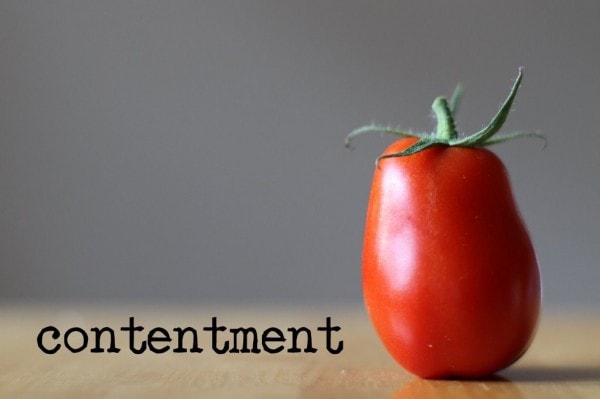(in case you’re just getting here, you may want to check out the previous posts in this series: Look for the good, and Stop looking up.)
Last week, we talked about how looking up at things that appear to be better, nicer, newer, handier and just flat-out superior to yours is a sure way to sabotage your contentment efforts.
I offered some alternatives to this looking up habit we have, but this week, I want to focus on one very powerful alternative.
Instead of looking up at those who have (or appear to have) more, try thinking about those who have less.
If you’re like me, you haven’t seen much true poverty. Most of you who read this blog live in a culture somewhat similar to my own where food, shelter, clothing, and clean water are a given. In fact, they’re so much a given, we tend to take them for granted. And that means that instead of being thankful for those necessities, we pine away after new clothes, larger homes, fancier food, newer vehicles, and all manner of unnecessary items.
When I am tempted to pine away for stuff that’s nicer than mine, directing my thoughts towards those who are less fortunate is so helpful to me. Here’s an example of how it’s worked in my life.
When Mr. FG and I were newly married, we lived in a little one-bedroom basement apartment and our income was somewhere around $300-$400 a week. We had access to the upstairs washer and dryer once a week (that wasn’t easy once we had a baby!), and we had an old, avocado green stove. Our living room was furnished with hand-me-down couches and chairs. By American standards, this was not exactly the high life, and it would have been easy to be discontent. But really, it’s those American standards that are the problem. A Haitian woman would probably have thought she’d died and gone to heaven if she lived in that apartment with that income. After all, the apartment was heated and cooled, it had running water, it had consistent electricity, it had a fridge, and it was located in a safe area. And though that income level wasn’t extravagant, we always had clothes to wear and food to eat.
Seeing my life through the eyes of a Haitian changes everything.
(it’s worth noting that looking for the good was extremely helpful to me when I lived in the apartment. That apartment was affordable, which meant that Mr. FG and I could afford to get married, and that was a huge bonus! Also, our apartment had a fairly open floor plan and quite a few closets. The bathroom was the biggest we’ve ever had, and the apartment was located near my parents’ house and near Mr. FG’s work. Plus, our landlords let me teach piano lessons in that apartment, which helped our financial situation tremendously.)
Look Global
If you’re struggling with discontent, I highly recommend acquainting (or reacquainting) yourself with the situations of people groups around the world. Read about people who don’t have clean water and the diseases that come from a lack of clean water. You’ll probably stop hankering after bottled water and sweet drinks and will instead be thrilled to pieces about your clean tap water.
Learn how Haitians who can’t afford rice have to make mud cookies to feed themselves, and suddenly your leftovers or your beans and rice won’t seem so bad.
And if you, like me, have struggled to find contentment when it comes to your home, check out this one from Haiti, which housed 10 people (the door is not even 5 feet tall).
 (from Building Homes for Haiti)
(from Building Homes for Haiti)
I’m pretty sure those 10 people would think my split-foyer is a mansion 😉 And they’d probably think it’s way too big for only 6 people!
Look Back
Looking at extreme examples of poverty from around the globe is really helpful to me, but I also have often found comfort in looking back in history. When I feel unhappy about my house (the style, the size, the floor plan), I think about what homes were like in America not so very long ago.
I think about Laura Ingalls Wilder’s homes through the years, some of which were exceedingly small. Yet, it seems like her family managed to be content and happy and I find great encouragement in that. If they could be happy in a makeshift lean-to on the prairie, I can definitely be happy with my house.
I don’t even have to go back that far in history to find perspective, though. My neighborhood is filled with small ranch-style homes from the 50’s and 60’s (the split-foyers were a 70’s addition!), and when I think about the fact that families with multiple children happily managed in these homes, the size of mine seems more than sufficient.
I’ve mostly talked about houses in this post, but the principle here is widely applicable.
Bummed that you don’t have an iPhone? Remind yourself that people survived (and some still do) with no phones, or with nothing but corded home phones for years on end.
Blue about not being able to afford a nice MP3 player? Remember that people in poor countries hardly ever get to listen to music like we do, or that back in the day, you had to pay to go to a concert to hear good music (I think about this often as orchestras, Michael Buble, and Sovereign Grace fill our living room).
Unhappy with your wardrobe? Do like I do, and think about people in Kenya who own 1-2 pieces of clothing, or remind yourself that women used to get by with just a handful of dresses. If they could do it, we can too!
Hate your job? Consider how many people in America would love to be working right now, and your perspective will change (in my case, I think about how many moms would love to work from home like I do, and gratefulness soon follows).
Practice, practice, practice
This is the last post in our contentment series, and I hope the ideas I’ve shared will be as helpful to you as they’ve been to me. Before I hit publish on this post and conclude the series, I just want to encourage you to practice contentment. I’ve talked about how a journey to contentment needs to be intentional, and I’d also add that it needs to be ongoing.
Our default mode is usually discontent, and our hearts and attitudes need constant adjusting…you can’t apply these principles for a week and expect contentedness to pervade your life. Discontent will quickly take over if you let it, so practice looking for the good, looking at those who have less, and avoiding the temptation to look up.
The more you practice, the more this stuff will become second nature. Maybe one day down the road, discontent will pop up, and you’ll start looking for the good without even thinking about it!
Your Thoughts?
I’d love to hear your thoughts on this idea of looking at those with less, or just on the whole topic of contentment. Comment away!


Susan
Sunday 2nd of March 2014
I've watched extremely wealthy people live their lives on reality tv and now realise that they are not that different from your average person. They may have extravagance but it doesn't make them any happier really. In fact I get the impression that they have more problems, than me anyway. I have been working hard at eliminating the clutter I have in my home due to unnecessary spending on items that are not needed. I feel ashamed and regretful about that and have decided that I will think carefully about any purchases in the future. Can I do without this? Will this add to the clutter I'm trying to be rid of?
Susan
Sunday 2nd of March 2014
One of the thoughts that helps me is that this life will end one day but I will have another life that will be for all eternity. So what if I live in a humble home with a less than average income now, when one day I will live in the 'mansion with many rooms' and have in abundance. This life is temporary.
Peggy
Monday 16th of September 2013
Thank you for this wonderful eye-opening segment. Joblessness has prompted me to become frugal in our day to day habits. Today I was feeling a little shabby and sorry for myself and was sorely tempted to go my favourite online shop for "just one or two autumn/winter tops because I really need them." Luckily, before I went shopping I sought some "perspective" online and came up with your contentment series. Now, not only do I not feel the need to shop for more clothes to add to an already full closet, but I feel absolutely blessed, and, yes, content. Yours is a message I will keep coming back to again and again. Thank you so very much!
Lindsay
Tuesday 21st of August 2012
Thank you for this series. I am such a drama queen and sometimes I forget how beautiful it is just to appreciate the things you have. I am good at noticing the beautiful in the outside world (blue sky- such a novelty in the UK) but less skilled about seeing it in my own life. I think I will come back to these thoughts time and again when I can feel myself focusing on the wrong things.
Kathleen
Tuesday 10th of April 2012
I have been reading your blog for a month or so and have enjoyed it so much. I have especially enjoyed the contentment series. As a stay-at-home, homeschooling mom of two, I can relate to many of your blogs. I believe your articles about contentment are so very important and I'm using the "think of 3 things to be grateful for" with my own daughter. I read a book "When All You've Ever Wanted Isn't Enough" by Rabbi Harold Kushner, years ago. It was recommended by my pastors' wife when I was going through a serious time of discontent. It made a huge difference in my perspective. Hope you check it out.